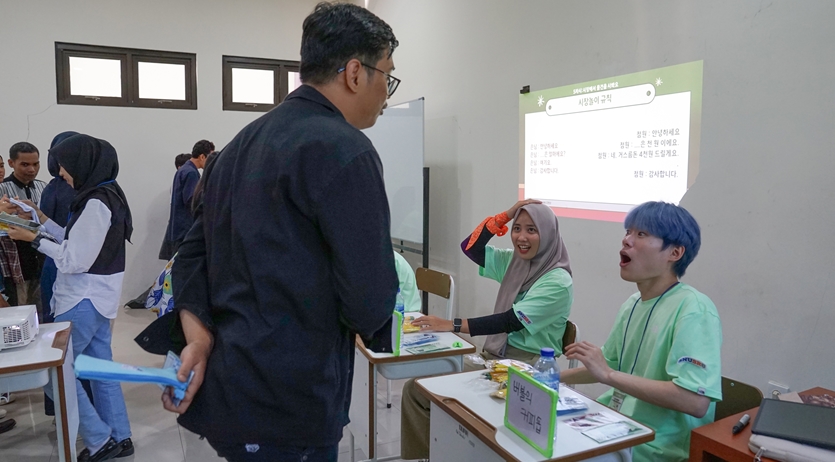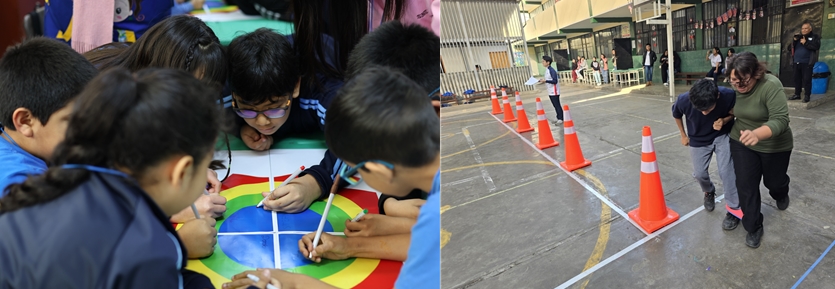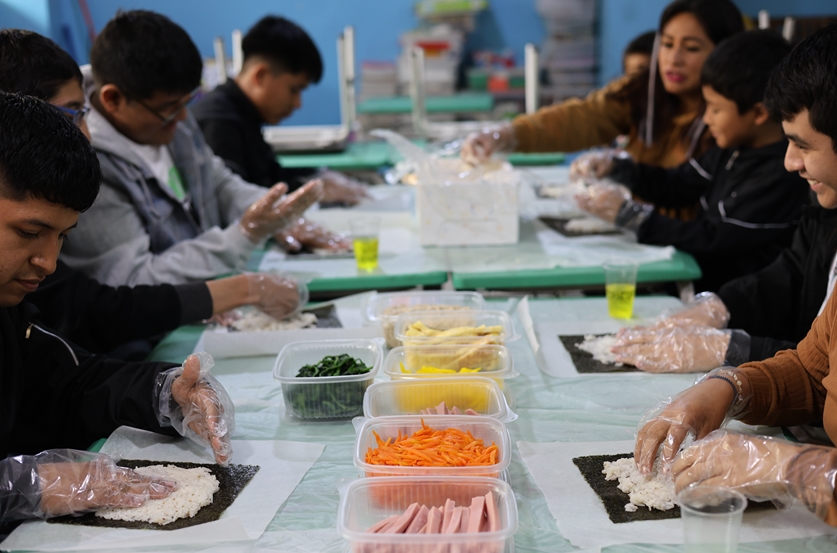In the scorching summer, 180 members of the Global Seoul National University Social Responsibility(SNUSR) Corps visited four countries—Uzbekistan, Nepal, Indonesia, and Peru. The corps successfully completed meaningful activities in each country and returned home safely.
Sharing Activities with the Theme "Safe Me, Safe Us"
The “Uzro” team, which began preparing for its dispatch since May 21, 2024, successfully concluded its activities in Samarkand, Uzbekistan, from July 29 to August 8, 2024.
The “Uzro” team, named to signify “to Uzbekistan,” was composed of members from Seoul National University as well as local members from Samarkand State University of Foreign Languages, Samarkand State Medical Institute, and the Uzbekistan-Finland Pedagogical Institute. The team visited Public Kindergartens No. 62 and No. 80 in Samarkand, where they conducted a four-day early childhood education program. For the kindergarten children, the Uzro team designed activities under the theme “Shape Land,” where the children could learn and experience various shapes. Shape Land was composed of the Triangle Village, Circle Village, and Square Village. The children explored each village in turn, and the activities culminated in a shape party. In addition to the early childhood education program, the Uzro team also engaged in medical and cultural sharing activities under the theme “Safe Me, Safe Us,” making the 11-day trip deeply meaningful.

The participating students shared their reflections: “It was a time to deeply contemplate the true meaning of contribution, and I realized the important values that will guide my career decisions.” Another remarked, “Although the language barrier was challenging, we developed our unique way of communicating through eye contact, facial expressions, and gestures.” A third added, “I believe this is the kind of power that can change the world.”
Heartfelt Cultural Exchange and Health Outreach with Alumni The 2024 Summer Nepal SNUSR Corps Program, conducted with alumni, took place from August 5 to August 15. The team "Neonshine," named by combining "Ne" from Nepal and "Sha" from Seoul National University, signifies creating shining moments together(Shine) in Nepal (Ne) and beyond (On).
The Neonshine team, consisted of members from Seoul National University and local members from Kathmandu Medical College, conducted arts and physical education classes for four days at Shree Chhampi Devi Secondary School. The program featured cultural exchange activities, including traditional Korean cultural experiences, Samulnori (Korean traditional percussion), K-pop dance, and fan dance performances. The team members felt a deep sense of fulfillment and love as they saw the joy on the children's faces.

The most special aspect of this year's Nepal SNUSR Corps Program was the participation of alumni. The program, featuring alumni, is recognized as a model that expands their expertise and positive influence in social contribution activities for both Seoul National University and the broader community. Under the leadership of alumni, the team conducted parent education, hygiene education for students, and physical measurements.
During the hygiene education, the focus was on basic hygiene habits such as hand-washing and brushing teeth, helping students incorporate these practices into their daily routines. Additionally, the team conducted physical measurements, including BMI, blood pressure, vision tests, and urinalysis, to assess the current developmental and health status of the local students. It was a special time to create shining moments in Nepal with warm-hearted people. Although Neonshine's activities have ended, we hope that the light they brought will continue to shine.
Empowering Lombok's Youth
The team name "Inhari" combines "In" from Indonesia and "Hari," meaning "day" in Indonesian, symbolizing a commitment to making each day meaningful and creating positive changes in Indonesia. The Inhari team, consisting of members from Seoul National University and local members from Mataram University (UNRAM) and National University (UNAS), carried out a 10-day educational program in the Lombok region from July 19 (Friday) to July 28 (Sunday).

The Indonesia SNUSR Corps Program is a five-year initiative, supported by Samick Musical Instruments Co., and has been active in the Lombok region since the winter of 2022. The program features a local curriculum that includes basic Korean language, EPS TOPIK (Employment Permit System Test of Proficiency in Korean), and Korean language education for tourism and business. Additionally, it offers digital business courses designed for unemployed youth. The education is customized according to proficiency levels and includes marketing training using digital channels.
In the EPS TOPIK class, activities focused on learning frequently tested vocabulary and grammar to Lombok youth preparing for the EPS TOPIK exam. The "Run with Korean!" class involved learning expressions from Korean dramas and performing a play based on a Korean script, helping participants develop their speaking and reading skills through extended dialogues. In the "Let's Visit Tourist Attractions" class, students learned how to navigate tourist sites using Korean public transportation. This practical approach to Korean language education allowed the youth to engage with the language in meaningful ways and find great satisfaction in gaining practical knowledge.

The activities of the Inhari team were significant not only for the Seoul National University members but also for the local members, partner universities, cooperating organizations, and the beneficiaries involved. The experience of bringing together individuals from diverse backgrounds to collaborate towards a common goal was deeply meaningful for everyone involved.
Fostering Connection Through Family Camp
The Peru SNUSR Corps Program, dispatched for the first time this year, took place from August 4 (Sunday) to August 16 (Friday) in an disadvantaged area near Lima, Peru, in collaboration with local members from Pontifical Catholic University of Peru (PUCP). The team name "Shapaca" combines "Sha" representing Seoul National University and "Alpaca," a symbolic animal in Peruvian history and culture, reflecting the team's ambition for mutual understanding and cooperation between Seoul National University and Peru. The Shapaca team designed four programs: Boundary Respect Education, Health Education, Elderly Health Campaign, and a Family Camp. Among these, Boundary Respect Education and the Family Camp were significant challenges for the Shapaca team, as they were tailored to reflect the local context in Peru.

Boundary Respect Education taught students to recognize personal boundaries and respect others. It was heartwarming to see the children come together to complete the boundary respect carpet and write the phrase "Respect everyone's boundaries" on pipe cleaner dolls crafted by the Shapaca team. This simple activity brought genuine smiles to their faces—a priceless reward. In another segment, students created and acted out a script based on a drama about sexual self-determination. The sight of students using various classroom items as props and performing lively acting was both entertaining and moving.
The Family Camp aimed to enhance family cohesion through activities that encouraged participants to reflect on and spend time with their families. All activities in the Family Camp were designed to be completed in pairs with parents, maximizing opportunities for communication between parents, children, and other family members. Activities included drawing a family tree, recalling happy family memories, writing letters to parents, and creating a family timeline in a "Family Wikipedia" activity. For participants who had been preoccupied with their busy lives, this was a chance to deeply reflect on their family's past, present, and future, fostering a profound sense of fulfillment.
The camp concluded with making kimbap (Korean sushi rolls) together and a family sports day, along with cultural performances. Although the ingredients and cooking methods were unfamiliar, everyone enjoyed making and eating the kimbap together with smiles on their faces. The joy of children playing dodgeball with their parents and participating in a three-legged race, while hugging their parents, created lasting memories. Although the event lasted only a day, the sheer happiness of seeing the program, which had been planned over three months in Korea, come to life was truly indescribable.

This time spent reflecting on the most precious value in life—family—was a valuable experience for both the local families in Peru and the participants of the SNUSR Corps Program.
Translated by InKyung Bae (Department of English Language and Literature)

